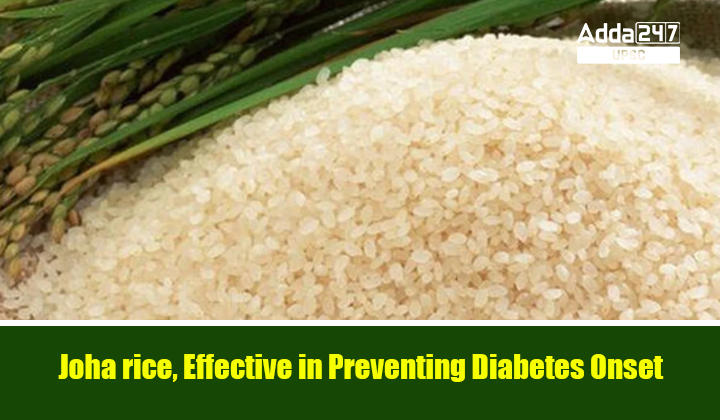Table of Contents
Joha Rice: Joha rice is a variety of short-grain winter paddy cultivated in the Northeastern region of India. It is known for its distinctive aroma and delightful taste. This traditional rice has gained attention for its potential health benefits and is being studied for its nutraceutical properties. Joha Rice is also important for UPSC Prelims Exam and UPSC Mains Exam (GS Paper 3- Indian Agriculture, Various crops and associated features).
Joha Rice in News
Joha rice, an aromatic rice variety grown in the Northeastern region of India, has been found to have beneficial effects in reducing blood glucose levels and preventing the onset of diabetes. As a result, it is considered a valuable nutraceutical option for managing diabetes.
Joha Rice Details
Joha rice, a winter paddy characterized by its distinct aroma and delicious taste, is a short-grain variety. Traditional beliefs suggest that individuals who consume Joha rice have a lower risk of developing diabetes and cardiovascular diseases. However, these claims require scientific validation to confirm their accuracy.
Nutraceutical Properties of Aromatic Joha Rice
In order to investigate the nutraceutical properties of aromatic Joha rice, researchers at the Institute of Advanced Study in Science and Technology (IASST), an autonomous institute under the Department of Science and Technology, conducted a study.
- Rajlakshmi Devi and Paramita Choudhury focused their research on the nutraceutical aspects of aromatic Joha rice.
- Through laboratory analysis conducted in vitro, they identified two unsaturated fatty acids: linoleic acid (omega-6) and linolenic acid (omega-3).
- These essential fatty acids, which are not produced by the human body, play a crucial role in maintaining various physiological functions.
- Omega-3 fatty acids have been found to have preventive effects on metabolic disorders like diabetes, cardiovascular diseases, and cancer.
- Additionally, Joha rice has demonstrated its efficacy in reducing blood glucose levels and preventing the onset of diabetes in diabetic rats.
Joha Rice Significance
In addition to its nutritional benefits, the researchers discovered that scented Joha rice possesses a more balanced ratio of omega-6 to omega-3 essential fatty acids compared to the commonly consumed non-scented variety.
- The optimal ratio of omega-6 to omega-3 fatty acids for maintaining a healthy diet is approximately one.
- Utilizing this Joha rice, the researchers have developed a patented rice bran oil that they believe to be effective in managing diabetes.
- Furthermore, Joha rice is abundant in various antioxidants, flavonoids, and phenolics.
- Among the reported bioactive compounds found in Joha rice are oryzanol, ferulic acid, tocotrienol, caffeic acid, catechuic acid, gallic acid, tricin, and others.
- Each of these compounds has been associated with antioxidant properties, hypoglycemic effects, and cardiovascular protection.
Overall, Joha rice shows promise as a nutritious and potentially beneficial food option. Ongoing research aims to validate its traditional claims and explore its potential role in promoting health and managing various conditions.
Agricultural Produce Marketing Committees (APMC), History, Benefits, Challenges, Model APMC Act
| Follow US |
| UPSC Govt Jobs UPSC Current Affairs UPSC Judiciary PCS Download Adda 247 App here to get the latest updates |



 TSPSC Group 1 Question Paper 2024, Downl...
TSPSC Group 1 Question Paper 2024, Downl...
 TSPSC Group 1 Answer key 2024 Out, Downl...
TSPSC Group 1 Answer key 2024 Out, Downl...
 UPSC Prelims 2024 Question Paper, Downlo...
UPSC Prelims 2024 Question Paper, Downlo...
